Before the introduction of cross-platform development, building applications that run on all operating systems and devices was no less than an uphill battle. Companies had to hire multiple resources, invest heavily in infrastructure, and handle multiple teams simultaneously.
The era we are living in demands sheer pace to meet the requirements of the modern-day digital world. Since 64.04% of internet traffic comes from mobile, industry specialists had to come up with modern technologies that reduce the workload and increase efficiency.
Hence, they came up with a cross-platform development environment that allowed developers to create applications for multiple platforms with a single codebase.
What does this mean?
This means that developers write code once and deploy it across multiple platforms. Cross-platform development, which provides smart, efficient, and scalable solutions, allows this to happen.
Cross-Platform Development – An Understanding of the Concept
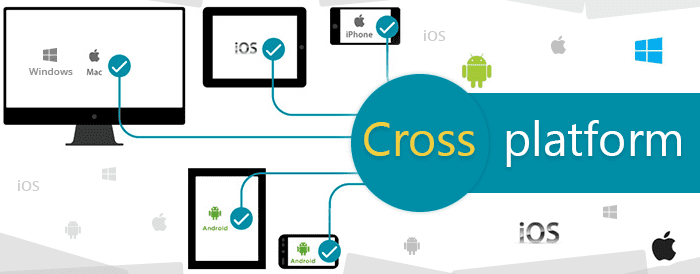
It is the process of developing an application capable of working exceptionally well on multiple operating systems, such as iOS and Android, without needing to write code separately.
Instead of writing separate code for all platforms, developers can use a cross-platform approach to create applications that function smoothly on all systems.
Before we dive into the details, let’s understand with an example.
Let’s suppose you have to build an application that seamlessly works on iOS and Android devices. What will you do? The first and final solution you have is to hire developers of both stacks with expertise in the respective technologies.
Now, what will happen?
From recruitment to the hiring process, and from onboarding to development and completion, you will pay for two developers to have two applications that run on iOS and Android.
But think for a moment, what if you’ve hired a cross-platform developer?
Hiring a cross-platform developer would have cost you only one developer, as he would be proficient in building iOS and Android applications using a single codebase.
Significance of Cross-Platform Development
Let’s understand why cross-platform development should be your first choice.
- Cross-platform development is a cost-effective method. You have to invest in a single team that reduces the development time and resources.
- With one codebase, you achieve faster time to market.
- You get a wider reach as your application becomes accessible on all devices.
- You deliver consistency in the app’s look and functionality as you only have to maintain a single codebase.
Evolution of Cross-Platform Development
Here is an infographic information of how cross-platform development has evolved over the years.
Difference Between Cross-Platform and Native Mobile App
Development
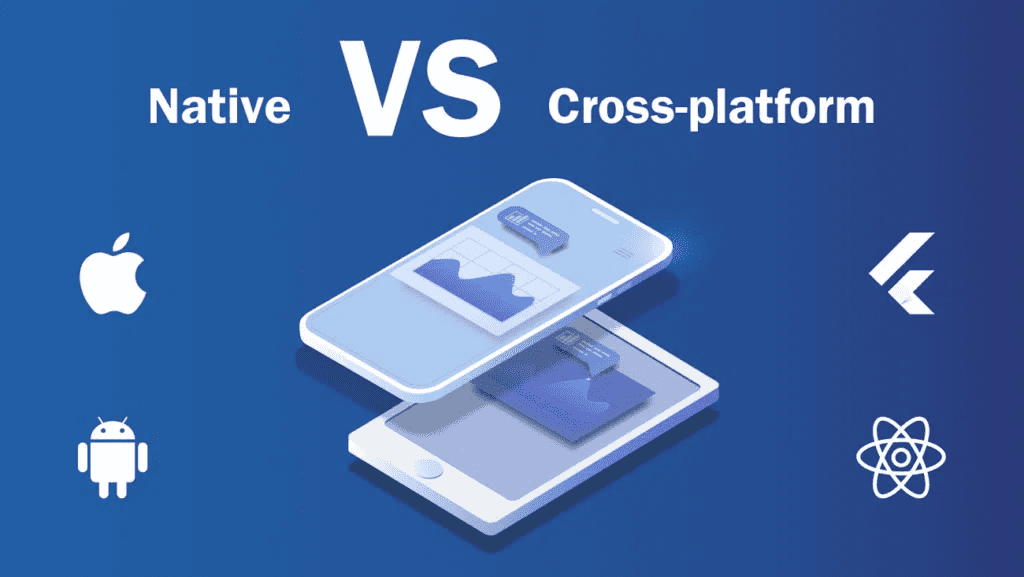
There are two core approaches to building applications for mobiles:
- Native Mobile Development
- Cross-platform Development
| Cross-platform Development | Native Development |
| Single codebase for iOS and Android | Separate code for iOS and Android |
| Single developer for both platforms | Two developers for both platforms |
| Quicker development | Development is time-consuming |
| Easier to test due to a single codebase | Challenging to test both apps |
| Less secure compared to native development | Highly secure due to native development |
| Cost-efficient due to a single codebase | Cost is higher due to separate applications |
Benefits of Cross-Platform Development
- It reduces the development cost
Firstly, cross-platform app development reduces your development costs. It is because developers write code once and deploy it across multiple platforms. Moreover, developers follow agile development methodologies, various tools, and reusable code blocks to minimize the efforts.
Moreover, you don’t have to invest in multiple teams or developers. One developer can build an application for various platforms.
- Speeds up the development process
Secondly, cross-platform development increases the development pace as it allows developers to reuse code at multiple stages and multiple times. Hence, the developer doesn’t have to write new code for every platform. As a result, it speeds up the development pace of your project.
- It promotes brand consistency across platforms
Further, imagine having a native application for expense management for iOS and Android devices. Both devices differ in design, functionality, and processes. Will this app be sustained? The answer is no.
Having a cross-platform app ensures maintaining brand consistency across platforms. A brand-consistent app is meant to succeed because it furnishes the same results on both devices.
- Deployment is faster
Next, you have faster deployment times. It is effortless to maintain and deploy any updates to the code of the cross-platform application. The reason is, you have to make changes in one code, and that change will be reflected on all platforms.
- Error management is easier
Lastly, handling errors in such applications is easier. Whenever there is an error, you have to debug the issue, which will be implemented on both devices.
Popular Cross-Platform Development Tools and Technologies
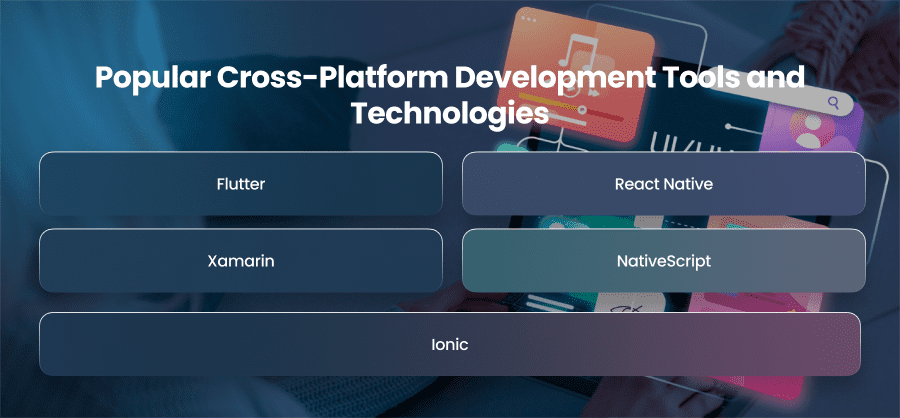
Let’s have a look at the five most popular cross-platform development tools and technologies.
Flutter
Developed by: Google
Known for: Building natively compiled applications for mobile, web, and desktop using a single codebase.
Key Features of Flutter
- With the hot reloading feature, developers can see the changes in real time without restarting the app.
- Flutter delivers high performance as it compiles to native ARM code.
- It uses the Dart programming language, which is easy to learn and delivers high performance.
React Native
Developed by: Facebook
Known for: Building mobile applications using JavaScript and React.
Key Features of React Native
- With React Native, developers can reuse the components across different platforms.
- The live reloading feature enables developers to see the changes instantly.
- It has extensive support for third-party libraries and plugins.
Xamarin
Developed by: Microsoft
Known for: Building mature applications using C# and .NET.
Key Features of Xamarin
- It develops high-performance applications, furnishing native-like performance with native native API access.
- Easily integrates with Visual Studio.
- It gives access to a wide range of components to enhance functionality.
Ionic
Developed by: Max Lynch, Ben Sperry, and Adam Bradley
Known for: Building hybrid mobile applications using technologies like HTML, CSS, and JavaScript.
Key Features of Ionic
- It comes with a vast library of pre-built components assisting in developing quick applications.
- Using Ionic will give you a consistent UI across all formats.
NativeScript
Developed by: Telerik
Known for: Building native mobile applications using JavaScript, TypeScript, or Angular.
Key Features of NativeScript
- It has direct access to native APIs for both iOS and Android.
- It has a flexible UI, allowing the use of native UI components or custom components.
Why Cross-Platform Development is Better for Startups?
Startups often face challenges when they start their journey. They usually have a limited budget and tight deadlines, which is critical for their success. Let’s find out the reasons why startups opt for cross-platform development.
- Startups can deliver top-notch, quality work while enjoying minimal labor costs and development time.
- Startups are often tight on deadlines, and cross-platform development allows them to build applications with faster turnaround times.
- They are empowered to launch MVPs quickly.
- They reach a broader audience without doubling the development efforts.
- Cross-platform development is a cost-efficient phenomenon.
Challenges in Cross-Platform Development
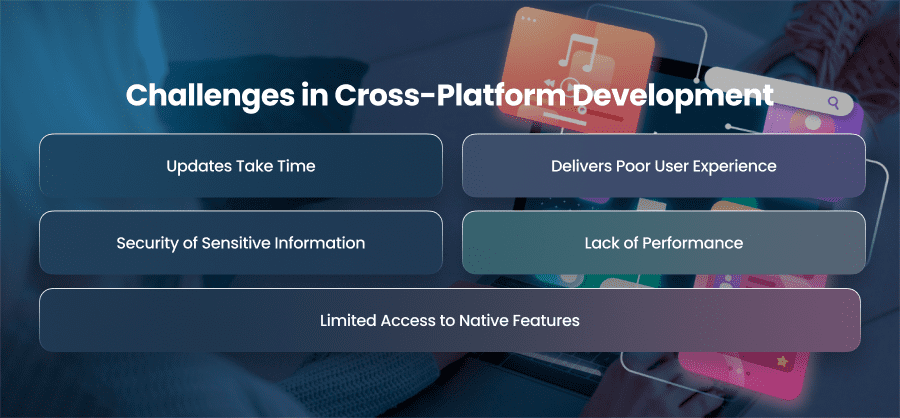
With so many perks of cross-platform development, there come some challenges one has to deal with. Here are some significant challenges you might encounter while developing a cross-platform application.
Updates Take Time
While working with cross-platform frameworks, you will witness that the updates of such platforms take time to upgrade and support new features. On the other hand, native apps are instantly updated whenever there is an update from Google or Apple.
Delivers Poor User Experience
It is great that you get to build applications for different platforms with a single codebase. However, this takes you to the downside of cross-platform as mobile developers can’t leverage platform-specific features such as 3D effects, animations, or enhanced graphics.
Security of Sensitive Information
In cross-platform development, taking care of sensitive information can be challenging sometimes. Using cryptographic techniques can enhance security and maintain data integrity across platforms. Moreover, you can also avoid this issue by incorporating robust encryption and authentication protocols that protect sensitive information, promoting trust, transparency, and confidence.
Limited Access to Native Features
Even though cross-platform frameworks have been in the industry for years, some native capabilities and APIs might not be available to them. This limitation can create issues for developers to build a feature-rich app that meets all quality standards.
Lack of Performance
There is no doubt about the benefits of cross-platform frameworks, but they are still behind native platforms in terms of performance. These platforms, compared to native ones, show less performance.
Tips and Tricks for Building Cross-Platform App Development
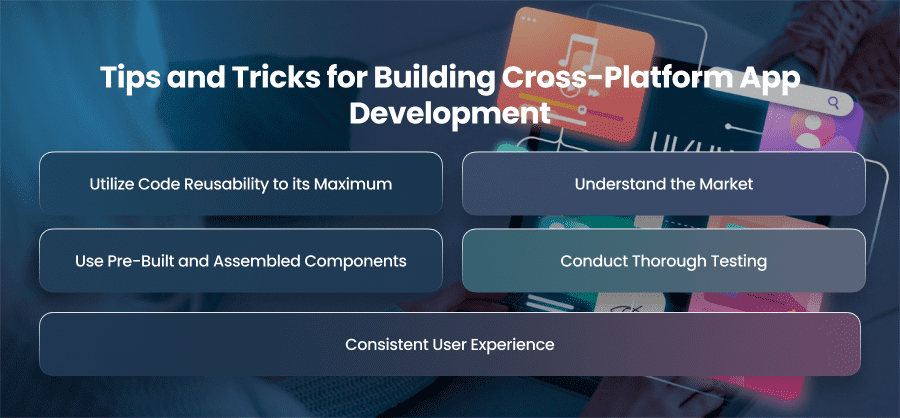
Expert skill level, along with proficiency in multi-platform development platforms leads to maximum results. To reach their targets, developers working across platforms need to implement best practices that produce high-performance and maintainable systems with uniform user interactions.
Here are the best tips and tricks while building a cross-platform application:
- Utilize Code Reusability to its Maximum
Firstly, you know well that you can reuse your code in multiple places in a cross-platform application. To enjoy this perk, you need to use it to its maximum (where it can be used). Moreover, you can structure your codebase to maximize reusability while allowing for platform-specific customizations.
- Understand the Market
Secondly, you must be vigilant to understand the market needs, which is possible by conducting thorough market research. This will help you get significant insights into user requirements. Further, by understanding the pain point of the user, you develop a cross-platform app that aligns with the user’s mind and requirements.
- Use Pre-Built and Assembled Components
Next, to speed up the development process and elevate quality and productivity, you should use pre-built and assembled components. Such components are easy to integrate during application development.
- Conduct Thorough Testing
Never neglect testing or consider it a donkey work. Always test all your components thoroughly. You can use automated testing tools to catch the bugs and issues at the early stages and ensure that your app works according to functionality across all devices and operating systems.
- Consistent User Experience
That’s true, that you can build an application for iOS and Android using a single codebase, but there are also some platform-specific guidelines that you must follow. Use the tools and components provided by the framework to achieve a consistent experience across devices and OSs.
How to Choose the Right Framework?
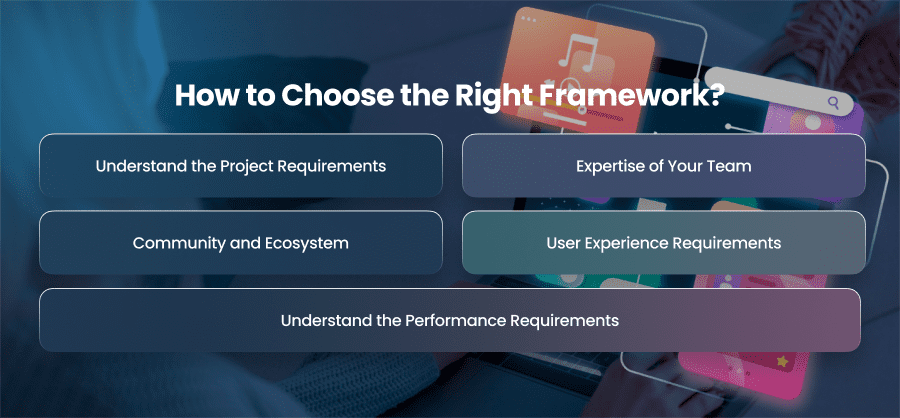
Choosing the right cross-platform framework is very important. The selection process depends on multiple elements, including project requirements and developer qualifications, and user interface standards.
These points will help you select the correct framework for your cross-platform development initiative.
Understand the Project Requirements
The first thing before initiating any project is to understand its requirements. Understand the user demand and what they are expecting from you.
Expertise of Your Team
Consider the development expertise of your team and choose the cross-platform framework accordingly.
Community and Ecosystem
The framework’s community, together with its ecosystem, maintains a vital position during development activities. Select a framework that has both an active supportive community together with many plugins and development tools for efficiency enhancement.
Understand the Performance Requirements
Your choice of framework should include a performance level that satisfies requirements when native APIs and high performance become necessary. The performance requirements of your project will be met by using frameworks such as Flutter and React Native, among others.
User Experience Requirements
You can opt for Flutter or Xamarin if the project requirements are a consistent and high-quality user experience.
Rounding Off!
In conclusion, cross-platform platforms ease mobile application development with their top-notch features and compatibility of using a single codebase for various devices and operating systems. Cost-effective, scalable, and time-efficient solutions are some of its irresistible perks that one can’t ignore.
Hence, it has become the go-to choice for startups and enterprises alike. All you have to do is understand the project requirements and choose the right framework accordingly.




